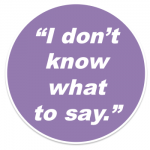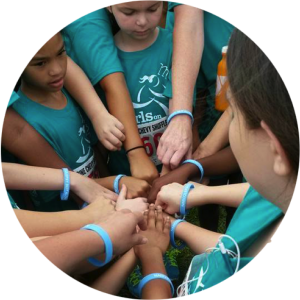Supporting a Friend With Narcolepsy
 If your friend or loved one was diagnosed with narcolepsy, you may wonder the best way show support. You want to help your friend through this difficult time, but it can be hard to know what to say or do. While there are no set rules for supporting a friend with narcolepsy, I hope these tips will help! (Save PDF Version)
If your friend or loved one was diagnosed with narcolepsy, you may wonder the best way show support. You want to help your friend through this difficult time, but it can be hard to know what to say or do. While there are no set rules for supporting a friend with narcolepsy, I hope these tips will help! (Save PDF Version)
Preparing yourself:
Take a few minutes to learn about narcolepsy. Your friend may be overwhelmed and not sure how to explain narcolepsy. Familiarize yourself with basics:
 Helpful tips when supporting a friend or loved one with narcolepsy:
Helpful tips when supporting a friend or loved one with narcolepsy:
- Make flexible plans that can be easily changed in case your friend needs to cancel or reschedule. If your friend needs to cancel or change plans – do not express hostility or negativity. Believe me, your friend feels badly. Let them know it’s okay.
- Allow for sadness – do not ignore uncomfortable topics or feelings.
- Practice “Active Listening” – Listen without shifting focus to yourself or others. Paraphrase and validate what your friend says in your own words. Examples: “I’m sorry to hear that … [rephrase their experience]” or “I’d be upset too if… [rephrase their experience]”.
- Offer to help with specific tasks, such as taking care of children, taking care of a pet, or preparing a meal. Many people find it hard to ask for help, and your friend will likely appreciate the offer. Follow through on a commitment to help.
- Let them know it’s okay to nap or take breaks. No need to constantly ask, but it’s nice to mention once in private. Your friend may feel uncertain about napping in certain settings, especially social occasions with friends or family. Give your friend permission and mention a quiet bedroom or sofa.
- Offer positive reinforcement: “You are incredible to take this on as …[a student, parent, in your teens, etc.].” or “I’m proud of you.”
 What to say:
What to say:
Here are some simple guidelines to use when talking to your friend with narcolepsy.
Avoid saying:
- I know just how you feel.
- You’re lucky you get to nap.
- I know just what you should do.
- I’m sure you’ll be fine.
- Don’t worry.
- Let me know what I can do. (Instead, offer specific ways you can help or other things you can provide if they need it.)
- Jokes about falling sleep (Narcolepsy’s sleepiness is more serious and pervasive than jokes imply. Your friend will likely have a sense of humor about aspects of narcolepsy, but follow your friend’s lead and tread cautiously).
 Do say:
Do say:
- If you feel like talking, I am here to listen.
- I was learning about narcolepsy online. What symptoms do you experience?
- I’m thinking about you.
- How are you feeling?
- How are the medications making you feel?
- If you need a break or nap, you can use my bedroom/car/shoulder.
- I don’t know what to say. (It is better to be honest than to simply stop calling or visiting out of fear/uncertainty. I’m a HUGE fan of “I don’t know what to say” or “I’m not sure how to ask this in a sensitive way”. Admitting uncertainty is endearing and a beautiful bridge for starting any difficult conversation.)
Specific Offers to Help:
Be creative and sincere. Remember that your friend’s needs may change, so be flexible in shifting your plans as needed. Here are some suggestions:
- Help with chores around the house, such as getting the mail, taking care of pets, cleaning, doing laundry, taking care of plants and flowers, and taking out the garbage.
- Schedule a night-in with takeout food and movies.
- Baby-sit children, take them to and from school and evening activities, and arrange for play dates.
- Call, email, or text but let your friend know it’s okay if he or she doesn’t reply.
- Drive your friend to an appointment or a support group meeting. You can take notes during a doctor’s appointment.
- Go for a walk together.
 Narcolepsy Super-Fans Welcome!
Narcolepsy Super-Fans Welcome!
Want to show more support? You rock!
- Order Awareness Bracelets
- Read Wide Awake and Dreaming: A Memoir of Narcolepsy
- Download Julie Flygare’s Narcolepsy Mobile App
Supportive friends makes a world of difference in coping with narcolepsy. People with narcolepsy often feel misunderstood, lost and alone. Your support will stand out.

Julie,
Another fantastic post. Thank you! I plan on sharing this, especially with my family members who are in absolute denial since my diagnosis after my brain injury 2 years ago. Since most live on the east coast 3000 miles away, it’s not usually a problem as I have little contact. However, my sister (the one you met) is getting married in October out here and everyone will be flying in. I think a little preparation before hand will be helpful. They are still of the thinking that narcolepsy isn’t real, I’m not really “sick” and (as my husband, sadly, STILL says) “if you’d only go to sleep earlier, you wouldn’t be so tired during the day”. Ah…if only it was that easy, right? However, I live my life now on my terms, and surround myself with loving, supportive people who “get” me (even if my own husband still doesn’t). And that’s thanks to YOU. You probably don’t remember this but the last time you were here, you said something out on my patio that really stuck, even if it seemed only a passing comment. You told me that it was OK and even that I DESERVED to feel validated for everything I’m either going through or the WAY I’m feeling about everything I’m going through. You also made me realize that instead of feeling guilty for no longer being able to earn the money I used to or do the things I used to be able to, I should be feeling very proud for the way I’ve handled my “new normal” and still take care of my child, my house, my mother-in-law, etc. And I should not blame myself or feel bad about myself if I can no longer live up to others’ expectations, as those expectations are THEIR problem. Do I live up to this everyday? No, of course not. I still struggle with guilt and feelings of unworthiness. But now I no longer struggle in silence or alone. I am the very definition of “Narcolepsy Not Alone” and I thank you for that wonderful gift.
xoxo (miss you girl…let’s plan a “play-date”!)
Melissa
Julie, thank you for your posts! They are very good to me! always help me face narcolepsy as something to live with and not as a curse, it was like I saw!
One thing missing is telling friends that during an attack of cataplexy or sleep paralysis or hallucinations, stand laughing and looked you up or sending you does not help! Ideally TOUCHING VC which helps stop cataplexy, still is not instant! That waking up and getting you wherever you off, pisses me off! Sometimes you do not want to fight the sleep, or just give up and let it go away faster!
I am a friend, supporter, wife, and biggest fan of someone with Narcolepsy with Cataplexy. I am in awe of her and her courage to face daily tasks the rest of us take for granted. I can see how hard it is for her… I can see the impact this rare condition has had on her and her life. I can’t for one minute truly understand how she must feel, and am not sure I would be able to show the strength she has. Despite her unimaginable feelings of exhaustion she fights through for us (we have two beautiful children). She fights through each and every day. The only advice I can offers any other supporters, friends, or significant others is to be there, when they need to sleep give them a quiet spot, understand they have not control of their sleepiness, it is not their fault, and most importantly…. Unconditionally support and acceptance. And for those of you who are fighting every day, like my wife … you are not alone in your fight.
Thank you Julie for everything you do and continue to do.
Hi my young adult daughter was diagnosed a few years ago with Narcolepsy. She does all the recommended things to help live with this disorder i.e. correct naps, diet, exercise, medication, dr. supervision, even some talk therapy a wile back. I am so supportive and have studied enough to understand this disorder is very challenging. Here is my problem…my daughter gets very irritable (part of it) and she targets me. Sometimes its so hurtful. I don’t want it to damage our relationship, as she is in her young 20’s and a very responsible person for her age. I need to find support. Lot’s of support for the narcoleptic, but not for family. Her father is supportive too, but getting impatient with how she treats me and talks to me. She doesn’t do this to him. so its causing friction in my marriage. I want to deal with this in the best way for her. Any help or links etc. would be much appreciated.
My granddaughter, Shayla. has been recently diagnosed with narcolepsy…..we now finally have the diagnosis….and she is just starting medication and changing diet. We are committed in helping her in everyway but it does help to have support at home. Sadly, that is where the commitment ends, as her school does want her and us to “control” this disorder and do not realize that it controls her…
Yesterday we received a text with a picture of her sleeping. We know this is difficult for the school….we have been trying for four years to finally find out. How do you think it is best to help the school understand this? We do not want to pull her out of school but this may be the only thing we can do.
Thanks in advance for any information….we are newbies to this.
Sonja Hovatter
1031 Low Gap Road
Princeton WV 24740